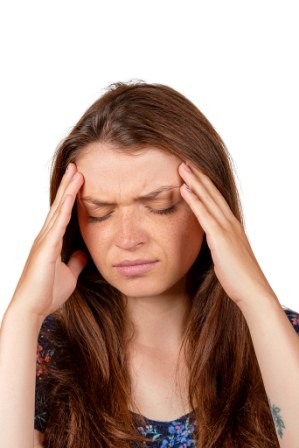Symptoms of Tension Headaches
by Nancy Hearn, CNC
Note: As an Amazon Associate I earn from qualifying purchases.
Common symptoms of tension headaches include muscle contraction, bilateral pain, dull pain, and difficulty sleeping.
The tension or muscle-contraction headache is the most common type of headache. The University of California, San Francisco Health Center reports that 88 percent of women and 68 percent of men get this type of headache.
Tension headaches are most common in adults and teenagers, but can occur at any age. The National Institutes of Health (NIH) notes that tension-type headaches which occur more than twice a week for several months are considered chronic.
If the tension headache becomes chronic or severe, consult your health care provider to rule out other underlying disorders. The following are some of the most common symptoms of tension headaches.
Muscle Contraction
A tension headache is almost always associated with tightness in the muscles of the neck and scalp, and occasionally the face. According to NIH, this type of muscle contraction is often caused by anxiety or stress.
In addition, eyestrain or holding the head in one position for a long time, such as working on the computer or stooping over a microscope, can cause a tension headache.
Bilateral Pain
Tension headache pain occurs on both sides of the head, or bilateral, rather than on one side of the head or in one specific area. It often begins in the temples, forehead or back of the head and is also felt in the back of the neck and shoulders, according to NIH.
Dull Pain
The pain of a tension headache feels like dull pressure rather than throbbing pain. People often describe the pain as band-like or vise-like.
However, the pain can range from mild to severe in intensity. For this reason, patients with tension headaches may be misdiagnosed with a migraine. NIH also notes that a migraine headache can occur at the same time as a tension headache.
Difficulty Sleeping
A typical response to tension headache is the inability to sleep. Many people will have difficulty getting to sleep, struggle with restlessness or wake up without feeling rested.
According to NIH, sleeping with the neck in the wrong position or sleeping in a cold room can cause the muscle tightness associated with a tension headache.
References
UCSF Medical Center: Tension Headache: Signs and Symptoms
Further reading . . . .
Dehydration Causes Stress – And Stress Can Cause Further Stress
Return from Symptoms of Tension Headaches to Health Benefits of Drinking Water
If you would like to reproduce or republish this article or any other article on this site, feel free to do so but please include a reference or link to the article at WaterBenefitsHealth.com.
Sign Up for Our Monthly
Newsletter
Visitor Comments
"This was the best and most straight forward info on the net yet. I asked a question and got an answer that made sense. Thank you so much!" - Linderlinder
FINALLY!!! I have been wondering about this for years with no 'solid' answer. This is exactly what I've been wanting to know! Thank you for this share..." by Andy
"Thank you for the information, Nancy. I appreciate it. Your article and findings are very helpful, referring to dehydration." - Carolyn
"Lemon water is one drink both my wife and I can't drink. It upsets our stomachs. We are in our sixties and in very good health—well, better health now that we drink about 2 liters plus of water each day. It has made so much difference to our digestive systems and recovery every day. Thank you for your website and effort." - Rod



